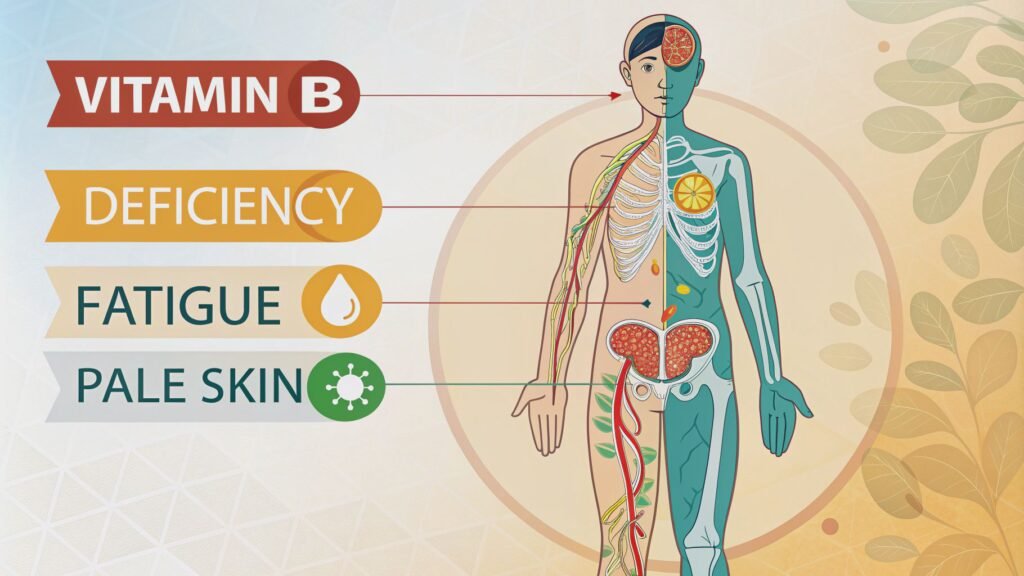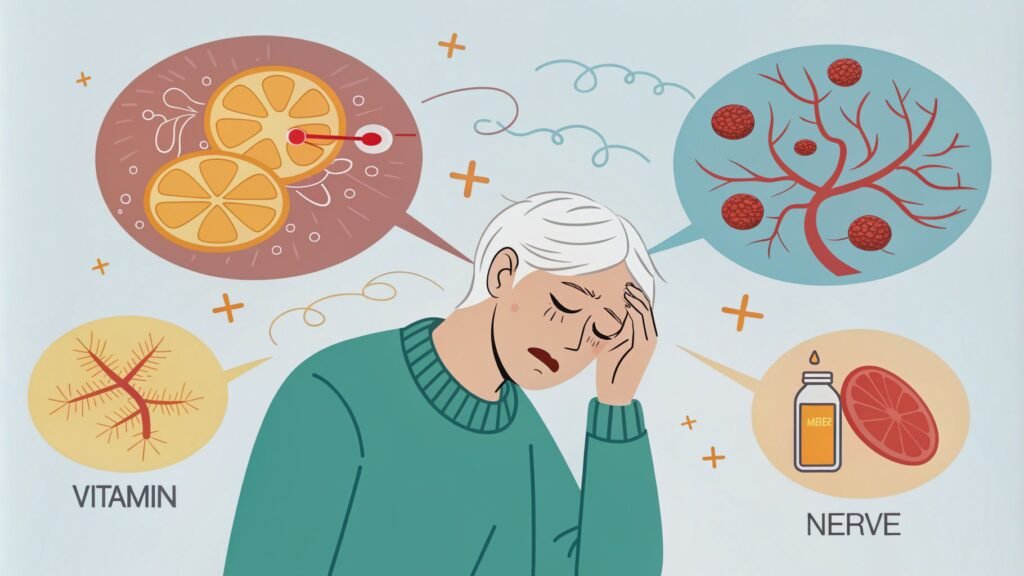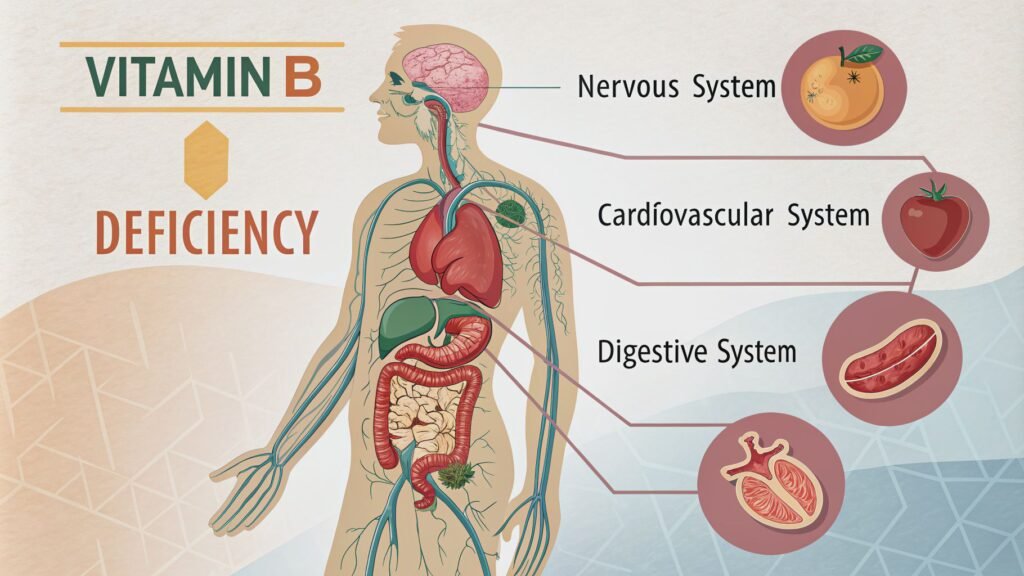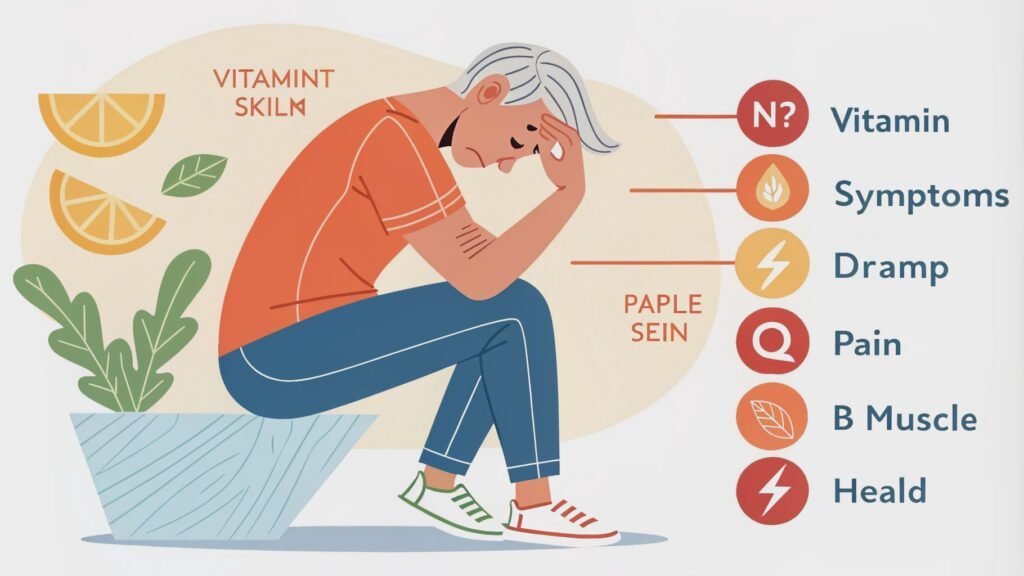
12 Alarming Signs of Vit B Deficiency You Must Know!
12 Alarming Signs of Vit B Deficiency You Should Know
Discover alarming signs of vitamin B deficiency and how to address them for better health and well-being.


Introduction
Overview of Vitamin B and Its Importance for Overall Health
Vitamin B is a group of essential nutrients that play a crucial role in maintaining overall health. These vitamins are involved in various bodily functions, including energy production, red blood cell formation, and the proper functioning of the nervous system. The B vitamins include B1 (thiamine), B2 (riboflavin), B3 (niacin), B5 (pantothenic acid), B6 (pyridoxine), B7 (biotin), B9 (folate), and B12 (cobalamin). Each of these vitamins has specific roles, but they often work together to support overall health and well-being.
Brief Explanation of Vitamin B Deficiency and Its Potential Impact on the Body
Vitamin B deficiency occurs when the body does not get enough of one or more of the B vitamins. This can happen due to a poor diet, certain medical conditions, or the body’s inability to absorb these vitamins properly. Vitamin B deficiency can lead to a range of health problems, including anemia, fatigue, nerve damage, and cognitive impairments. It is essential to recognize the signs of vitamin B deficiency early to address the issue and prevent long-term health complications.

Sign 1: Fatigue and Weakness
Explanation of How Vitamin B Deficiency Can Lead to Fatigue and Weakness
Fatigue and weakness are common symptoms of vitamin B deficiency. These symptoms occur because B vitamins are essential for converting food into energy. When the body lacks sufficient B vitamins, it cannot efficiently produce energy, leading to feelings of tiredness and weakness. For example, vitamins B12 and B6 are crucial for the production of red blood cells, which carry oxygen to the body’s tissues. A deficiency in these vitamins can result in anemia, causing fatigue and weakness due to reduced oxygen delivery to the muscles and organs.
Importance of Vitamin B for Energy Production
B vitamins play a vital role in the body’s energy production processes. They act as coenzymes in various metabolic pathways, helping to convert carbohydrates, fats, and proteins into usable energy. Here are some specific roles of B vitamins in energy production:
- Vitamin B1 (Thiamine): Helps convert carbohydrates into energy and supports nerve function.
- Vitamin B2 (riboflavin): involved in energy production and the metabolism of fats, drugs, and steroids.
- Vitamin B3 (Niacin): Supports the function of enzymes involved in energy production and DNA repair.
- Vitamin B5 (Pantothenic Acid): Essential for the synthesis of coenzyme A, which is involved in the metabolism of fats and carbohydrates.
- Vitamin B6 (Pyridoxine): Plays a role in amino acid metabolism and the production of neurotransmitters.
- Vitamin B7 (biotin): involved in the metabolism of fatty acids, amino acids, and glucose.
- Vitamin B9 (folate): Important for DNA synthesis and repair, as well as red blood cell formation.
- Vitamin B12 (cobalamin): essential for red blood cell production, DNA synthesis, and the proper functioning of the nervous system.

Sign 2: Pale Skin
How Vitamin B Deficiency Can Cause Pale or Jaundiced Skin
Pale or jaundiced skin can be a sign of vitamin B deficiency, particularly a deficiency in vitamin B12 or folate. These vitamins are essential for the production of healthy red blood cells. When the body lacks sufficient B12 or folate, it can lead to a condition called megaloblastic anemia, where the red blood cells are larger than normal and not fully developed. This results in a reduced number of red blood cells, leading to pale skin due to decreased oxygen delivery to the tissues. In severe cases, a deficiency in Vitamin B12 can also cause jaundice, a condition characterized by yellowing of the skin and eyes due to the breakdown of red blood cells and the accumulation of bilirubin.
Role of Vitamin B in Red Blood Cell Production
Vitamin B12 and folate are crucial for the production and maturation of red blood cells. Here’s how they contribute to this process:
- Vitamin B12 (cobalamin): Vitamin B12 is essential for DNA synthesis, which is necessary for the production of red blood cells in the bone marrow. It also helps maintain the health of nerve cells and supports the production of myelin, a protective sheath around nerves.
- Folate (Vitamin B9): Folate works closely with Vitamin B12 in the synthesis of DNA and the formation of red blood cells. It is also important for cell division and growth, making it essential during periods of rapid growth, such as pregnancy and infancy.
A deficiency in either of these vitamins can disrupt the production of red blood cells, leading to anemia and associated symptoms such as pale skin, fatigue, and weakness.
Read also: “10 Essential Roles of Vitamin K in the Body.”

Sign 3: Nerve Damage
Symptoms of Nerve Damage Caused by Vitamin B Deficiency
Vitamin B deficiency, particularly a deficiency in Vitamin B12, can lead to nerve damage. This is because Vitamin B12 is essential for the maintenance of the myelin sheath, which surrounds and protects nerve fibers. Without adequate Vitamin B12, the myelin sheath can become damaged, leading to a range of neurological symptoms. Common symptoms of nerve damage caused by vitamin B deficiency include:
- Tingling and Numbness: A common symptom is a tingling sensation or numbness in the hands and feet, often described as “pins and needles.”
- Balance and coordination issues: Nerve damage can affect balance and coordination, making it difficult to walk or perform everyday tasks.
- Muscle Weakness: A deficiency in Vitamin B12 can lead to muscle weakness and decreased muscle function.
- Cognitive Changes: Nerve damage can also affect cognitive function, leading to memory problems and difficulty concentrating.
Importance of Vitamin B for Nerve Health
Vitamin B, particularly Vitamin B12, is crucial for maintaining nerve health. Here’s why:
- Myelin Sheath Maintenance: Vitamin B12 is essential for the production and maintenance of the myelin sheath, which insulates nerve fibers and ensures the proper transmission of nerve signals.
- Nerve Cell Function: Vitamin B12 supports the normal function of nerve cells and helps prevent nerve damage.
- Neurotransmitter Production: B vitamins, including B6 and B12, are involved in the production of neurotransmitters, which are chemicals that transmit signals between nerve cells.
Sign 4: Cognitive Impairment
Impact of Vitamin B Deficiency on Cognitive Function
Vitamin B deficiency can have a significant impact on cognitive function, leading to issues such as memory loss, difficulty concentrating, and mental confusion. This is particularly true for deficiencies in vitamin B12 and folate, which are essential for brain health. Cognitive impairment caused by vitamin B deficiency can manifest in various ways, including:
- Memory problems: difficulty remembering recent events or information.
- Difficulty Concentrating: Trouble focusing on tasks or maintaining attention.
- Mental Confusion: feeling mentally foggy or disoriented.
- Mood Changes: experiencing mood swings, depression, or irritability.
Role of Vitamin B in Brain Health
B vitamins play a crucial role in maintaining brain health and cognitive function. Here’s how they contribute:
- DNA Synthesis and Repair: Vitamin B12 and folate are essential for DNA synthesis and repair, which are critical for the growth and maintenance of brain cells.
- Neurotransmitter Production: B vitamins, including B6, B9 (folate), and B12, are involved in the production of neurotransmitters, which are chemicals that transmit signals in the brain. Proper neurotransmitter function is essential for mood regulation, memory, and cognitive function.
- Homocysteine Regulation: High levels of homocysteine, an amino acid, are associated with an increased risk of cognitive decline and dementia. B vitamins, particularly B6, B9, and B12, help regulate homocysteine levels, reducing the risk of cognitive impairment.
By ensuring adequate intake of B vitamins, you can support nerve health, cognitive function, and overall well-being. If you suspect a vitamin B deficiency, it is important to seek medical advice and consider dietary changes or supplements to address the deficiency.
Sign 5: Mood Changes
How Vitamin B Deficiency Can Lead to Mood Swings, Depression, and Irritability
Vitamin B deficiency, particularly deficiencies in Vitamin B6, B9 (folate), and B12, can lead to mood changes such as mood swings, depression, and irritability. These vitamins play a crucial role in the production of neurotransmitters, which are chemicals that transmit signals in the brain and regulate mood. When the body lacks sufficient B vitamins, the production of neurotransmitters like serotonin, dopamine, and norepinephrine can be disrupted, leading to mood disorders.
- Mood swings: fluctuations in mood can occur due to imbalances in neurotransmitter levels.
- Depression: Low levels of serotonin and dopamine, which are linked to feelings of well-being and happiness, can result in depressive symptoms.
- Irritability: A deficiency in B vitamins can lead to increased irritability and difficulty managing stress.
Importance of Vitamin B for Mental Health
B vitamins are essential for maintaining mental health and emotional well-being. Here’s how they contribute:
- Neurotransmitter Production: B vitamins, especially B6, B9, and B12, are involved in the synthesis of neurotransmitters that regulate mood and emotions.
- Brain Function: B vitamins support cognitive function and help prevent mental fatigue and brain fog.
- Stress Management: Adequate levels of B vitamins can help the body cope with stress and reduce the risk of anxiety and depression.
Sign 6: Digestive Issues
Explanation of Digestive Problems Associated with Vitamin B Deficiency
Vitamin B deficiency can lead to various digestive problems, including nausea, constipation, and loss of appetite. These issues arise because B vitamins are essential for maintaining the health of the digestive system and supporting the metabolism of nutrients.
- Nausea: A deficiency in B vitamins can disrupt the normal functioning of the digestive system, leading to feelings of nausea.
- Constipation: B vitamins, particularly B1 (thiamine) and B3 (niacin), play a role in maintaining healthy bowel movements. A deficiency can result in constipation.
- Loss of appetite: Low levels of B vitamins can affect appetite regulation, leading to a decreased desire to eat.
Role of Vitamin B in Digestive Health
B vitamins are crucial for maintaining a healthy digestive system. Here’s how they contribute:
- Energy Metabolism: B vitamins help convert food into energy, supporting the overall function of the digestive system.
- Gut Health: B vitamins, such as B2 (riboflavin) and B3 (niacin), support the health of the mucous membranes lining the digestive tract, preventing inflammation and irritation.
- Nutrient Absorption: Adequate levels of B vitamins are necessary for the proper absorption of nutrients from food.
Sign 7: Muscle Cramps and Pain
How Vitamin B Deficiency Can Cause Muscle Cramps, Pain, and Weakness
Vitamin B deficiency, particularly deficiencies in B1 (thiamine), B6 (pyridoxine), and B12 (cobalamin), can lead to muscle cramps, pain, and weakness. These vitamins are essential for muscle function and energy production. When the body lacks sufficient B vitamins, it can result in muscle-related issues.
- Muscle Cramps: A deficiency in B vitamins can lead to muscle cramps due to impaired nerve function and electrolyte imbalances.
- Muscle Pain: Low levels of B vitamins can cause muscle pain and discomfort, often due to inflammation and poor circulation.
- Muscle Weakness: A lack of B vitamins can result in muscle weakness and reduced muscle function, affecting overall physical performance.
Importance of Vitamin B for Muscle Function
B vitamins play a vital role in maintaining healthy muscles and preventing muscle-related issues. Here’s how they contribute:
- Energy Production: B vitamins are involved in the metabolism of carbohydrates, fats, and proteins, providing the energy needed for muscle contraction and function.
- Nerve Function: B vitamins, particularly B1, B6, and B12, support the health of the nervous system, ensuring proper communication between nerves and muscles.
- Electrolyte Balance: B vitamins help maintain the balance of electrolytes, such as sodium and potassium, which are essential for muscle function and preventing cramps.
By ensuring adequate intake of B vitamins, you can support mental health, digestive health, and muscle function, preventing the associated symptoms of deficiency. If you suspect a vitamin B deficiency, it is important to seek medical advice and consider dietary changes or supplements to address the deficiency.
Sign 8: Vision Problems
Symptoms of Vision Problems Caused by Vitamin B Deficiency
Vitamin B deficiency, particularly deficiencies in Vitamin B2 (riboflavin), B6 (pyridoxine), and B12 (cobalamin), can lead to various vision problems. These symptoms may include:
- Blurred Vision: A lack of Vitamin B12 can cause optic neuropathy, leading to blurred or double vision.
- Light Sensitivity: Deficiency in Vitamin B2 can result in photophobia, or sensitivity to light.
- Eye Fatigue: Insufficient levels of B vitamins can cause eye strain and fatigue, making it difficult to focus.
Role of Vitamin B in Eye Health
B vitamins play a crucial role in maintaining eye health. Here’s how they contribute:
- Vitamin B2 (riboflavin): essential for protecting the eyes from oxidative stress and preventing cataracts.
- Vitamin B6 (Pyridoxine): Supports the production of neurotransmitters that are important for visual processing.
- Vitamin B12 (cobalamin): Maintains the health of the optic nerve, which is crucial for transmitting visual information from the eyes to the brain.
Sign 9: Shortness of Breath
Explanation of How Vitamin B Deficiency Can Lead to Shortness of Breath and Dizziness
Vitamin B deficiency, particularly a deficiency in Vitamin B12, can lead to shortness of breath and dizziness. This occurs because Vitamin B12 is essential for the production of red blood cells, which carry oxygen throughout the body. A deficiency can result in anemia, reducing the oxygen-carrying capacity of the blood and leading to symptoms such as:
- Shortness of Breath: Reduced oxygen levels can cause difficulty breathing, especially during physical activity.
- Dizziness: Inadequate oxygen supply to the brain can result in dizziness and lightheadedness.
Importance of Vitamin B for Oxygen Transport in the Body
B vitamins, especially Vitamin B12 and folate, are crucial for the production and maturation of red blood cells. Here’s how they contribute:
- Vitamin B12 (cobalamin): essential for DNA synthesis and the formation of red blood cells, which transport oxygen from the lungs to the rest of the body.
- Folate (Vitamin B9): Works closely with Vitamin B12 in the production of red blood cells and the prevention of anemia.
Sign 10: Heart Palpitations
How Vitamin B Deficiency Can Cause Irregular Heartbeats and Palpitations
Vitamin B deficiency, particularly deficiencies in Vitamin B1 (thiamine) and B12, can lead to irregular heartbeats and palpitations. These symptoms occur because B vitamins are essential for maintaining cardiovascular health and proper nerve function. A deficiency can disrupt the normal electrical activity of the heart, leading to:
- Irregular Heartbeats: Abnormal heart rhythms, known as arrhythmias, can occur due to a lack of B vitamins.
- Heart Palpitations: Sensations of a racing or pounding heart can result from deficiencies in B vitamins affecting heart function.
Role of Vitamin B in Cardiovascular Health
B vitamins play a vital role in maintaining cardiovascular health. Here’s how they contribute:
- Vitamin B1 (Thiamine): Supports the proper functioning of the heart and helps prevent heart failure.
- Vitamin B12 (Cobalamin): Essential for maintaining healthy red blood cells and preventing anemia, which can strain the heart.
Sign 11: Mouth and Tongue Issues
Symptoms of Mouth and Tongue Problems Caused by Vitamin B Deficiency
Vitamin B deficiency, particularly deficiencies in Vitamin B2 (riboflavin), B3 (niacin), B6 (pyridoxine), and B12 (cobalamin), can lead to various mouth and tongue issues. These symptoms may include:
- Sores and Ulcers: Painful sores or ulcers can develop in the mouth due to a lack of B vitamins.
- Swelling and Inflammation: The tongue may become swollen, red, and inflamed—a condition known as glossitis.
- Cracked Lips: Deficiency in B vitamins can cause cracks and fissures at the corners of the mouth, known as angular cheilitis.
Importance of Vitamin B for Oral Health
B vitamins are essential for maintaining oral health. Here’s how they contribute:
- Vitamin B2 (riboflavin): supports the health of mucous membranes in the mouth and prevents inflammation.
- Vitamin B3 (Niacin): Helps maintain healthy skin and mucous membranes, preventing sores and ulcers.
- Vitamin B6 (pyridoxine): involved in the production of neurotransmitters that support oral health.
- Vitamin B12 (cobalamin): essential for the production of red blood cells and the prevention of anemia, which can affect oral health.
Sign 12: Hair Loss
Explanation of How Vitamin B Deficiency Can Lead to Hair Loss and Brittle Hair
Vitamin B deficiency, particularly deficiencies in Vitamin B7 (biotin) and B12, can lead to hair loss and brittle hair. These vitamins are essential for maintaining healthy hair follicles and promoting hair growth. A deficiency can result in:
- Hair Loss: Lack of B vitamins can weaken hair follicles, leading to increased hair shedding and thinning.
- Brittle Hair: Insufficient B vitamins can cause hair to become dry, brittle, and prone to breakage.
Role of Vitamin B in Hair Health
B vitamins play a crucial role in maintaining healthy hair. Here’s how they contribute:
- Vitamin B7 (Biotin): Essential for the production of keratin, a protein that makes up hair, skin, and nails. Biotin deficiency can lead to hair thinning and loss.
- Vitamin B12 (cobalamin): Supports the production of red blood cells, which deliver oxygen and nutrients to hair follicles, promoting healthy hair growth.
By ensuring adequate intake of B vitamins, you can support eye health, cardiovascular health, oral health, and hair health, preventing the associated symptoms of deficiency. If you suspect a vitamin B deficiency, it is important to seek medical advice and consider dietary changes or supplements to address the deficiency.
Conclusion
Recap of the 12 Alarming Signs of Vitamin B Deficiency
- Fatigue and Weakness: Lack of energy and persistent tiredness.
- Pale Skin: Unusually pale or jaundiced skin.
- Nerve Damage: Tingling, numbness, and balance issues.
- Cognitive Impairment: Memory loss, difficulty concentrating, and mental confusion.
- Mood Changes: mood swings, depression, and irritability.
- Digestive Issues: nausea, constipation, and loss of appetite.
- Muscle Cramps and Pain: muscle cramps, pain, and weakness.
- Vision Problems: blurred vision and light sensitivity.
- Shortness of breath: difficulty breathing and dizziness.
- Heart palpitations: irregular heartbeats and palpitations.
- Mouth and Tongue Issues: Sores, swelling, and cracked lips.
- Hair Loss: Hair thinning, loss, and brittle hair.
Encouragement to Seek Medical Advice if Experiencing Any of These Symptoms
If you are experiencing any of these symptoms, it is important to seek medical advice. A healthcare professional can diagnose vitamin B deficiency through blood tests and recommend appropriate treatments, such as dietary changes or supplements. Early detection and treatment can prevent long-term health complications and improve your overall well-being.
Final Thoughts on the Importance of Maintaining Adequate Vitamin B Levels for Overall Health
Maintaining adequate vitamin B levels is essential for overall health and well-being. B vitamins play a crucial role in energy production, red blood cell formation, nerve function, cognitive health, and more. By ensuring a balanced diet rich in B vitamins or taking supplements as needed, you can support your body’s vital functions and prevent the adverse effects of deficiency. Prioritizing your nutritional health is a key step towards a healthier and more vibrant life.
Maintaining adequate vitamin B levels is crucial for overall health. B vitamins contribute to energy production, red blood cell formation, nerve function, and cognitive health. A healthcare professional can diagnose vitamin B deficiency through blood tests and recommend appropriate treatments, such as dietary changes or supplements. Early detection and treatment are vital to prevent long-term complications and improve well-being.





5 Comments
Pingback:
Pingback:
Pingback:
Pingback:
Pingback: